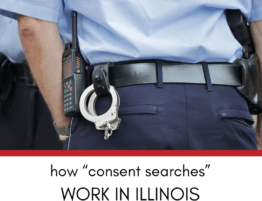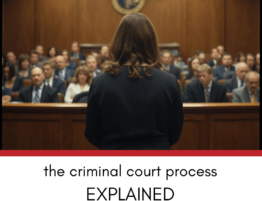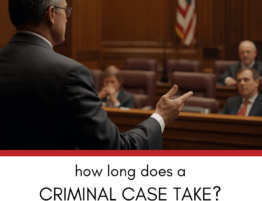
When faced with a police encounter, running might seem like an option, but it can lead to serious consequences. If you’re dealing with criminal charges in Illinois, understanding what happens if you run from the police is crucial.
What Happens if You Run From Police?
Fleeing from the police can have severe legal consequences. This guide explains the following:
- Legal consequences of fleeing
- Immediate risks of running
- Long-term impacts on your case
- Alternatives to running
- How a lawyer can help
Here’s a closer look at each.
Legal Consequences of Fleeing
In Illinois, running from the police is a crime. Depending on the circumstances, it can be charged as a misdemeanor or a felony. The severity of the charge often depends on whether the police were in a marked vehicle or if anyone was injured during the chase. A misdemeanor charge for fleeing might result in fines, probation, or a short jail sentence. A felony charge, however, can lead to more severe penalties, including longer prison terms and significant fines. It’s important to understand that fleeing can escalate a minor situation into a much more serious legal issue.
Related: Chicago criminal defense information
Immediate Risks of Running
Running from the police puts you at immediate risk. Police officers are trained to respond to fleeing suspects, which often involves a high-speed chase or physical confrontation. These situations are dangerous and can result in injuries or even fatalities for both the suspect and the officers. Additionally, running can lead to additional charges such as resisting arrest or obstruction of justice. These charges can complicate your case and lead to harsher penalties.
Long-Term Impacts on Your Case
The decision to flee can have long-term impacts on your case. Courts often view fleeing as an admission of guilt or an attempt to avoid responsibility. This can negatively influence your case, making it more difficult to negotiate plea deals or receive leniency from the court. Judges and juries may be less sympathetic if they believe you tried to evade justice. Moreover, a conviction for fleeing can leave a lasting mark on your criminal record, affecting future employment opportunities and your ability to secure housing or loans.
Alternatives to Running
Instead of running, consider alternative actions that can help protect your rights and minimize legal consequences. If you believe you are being wrongfully pursued, comply with the officer’s instructions and then immediately contact a lawyer. You have the right to remain silent and to request an attorney. Documenting the encounter and gathering evidence can be more effective in court than fleeing. Remember, running only complicates your situation and makes it harder to defend yourself later.
How a Lawyer Can Help
If you’ve fled from the police and are now facing charges, consulting a Chicago criminal defense lawyer may be a good idea. A lawyer can help you understand the charges against you and develop a defense strategy. They can negotiate with prosecutors to potentially reduce charges or penalties and represent you in court to ensure your rights are protected. Having a lawyer by your side can make a significant difference in the outcome of your case.
Related: What should you do if you’re charged with drug possession?
FAQ About Running From Police
Check out these commonly asked questions about running from the police. If you don’t see your question here, please call our office and we’ll find you the answers you need.
What Are the Penalties for Running From the Police?
Penalties can range from fines and probation for a misdemeanor to long prison terms and substantial fines for a felony. The severity depends on the specifics of the chase and whether anyone was harmed.
Can Running From Police Be Considered a Felony?
Yes, running from the police can be charged as a felony, especially if the chase resulted in injuries. Felony charges carry much harsher penalties than misdemeanors.
What Should I Do if I Am Being Pursued by Police?
If you are being pursued by the police, it’s best to stop and comply with their instructions. Running can escalate the situation and lead to additional charges. Contact a lawyer immediately after the encounter.
How Can a Lawyer Help If I Ran From the Police?
A lawyer can help by evaluating the specifics of your case, negotiating with prosecutors, and representing you in court. They can attempt to reduce charges or penalties and protect your legal rights throughout the process.
Related: What you need to know about DUI charges in Illinois
Will Running From the Police Affect My Criminal Record?
Yes, a conviction for fleeing from the police will go on your criminal record. This can affect future employment opportunities, housing options, and more. It’s essential to address these charges seriously and seek legal assistance.
Do You Need to Talk to an Attorney?
If you’ve been accused of a crime, we may be able to help you – and don’t worry: It’s completely confidential. Call us at 847-920-4540 or fill out the form below to schedule your free, private consultation with an experienced and skilled Chicago criminal defense attorney now.
Contact Us
"*" indicates required fields









